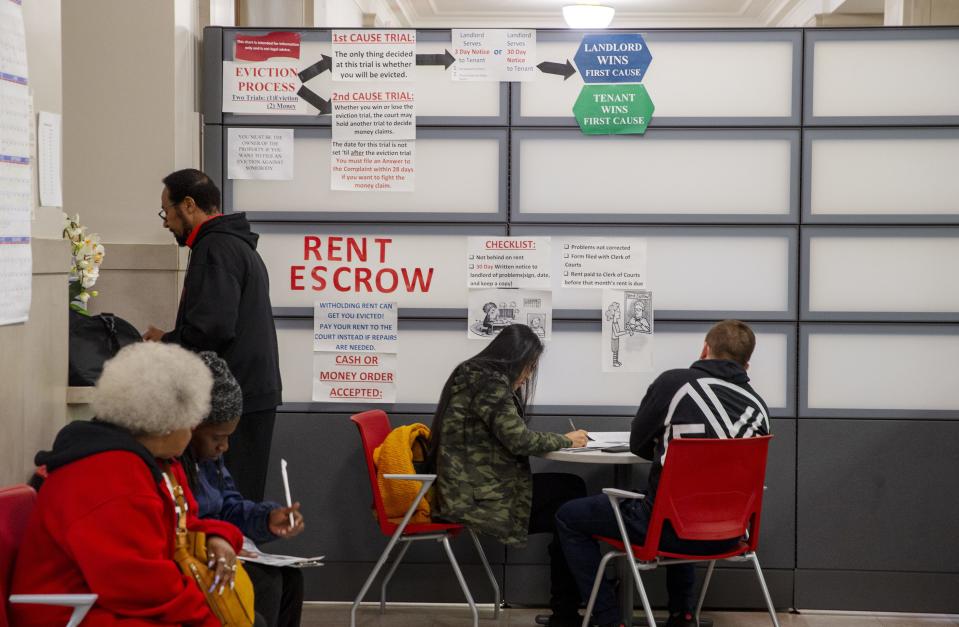'Tenants Bill or Rights' essential to stabilizing housing landscape | Opinion

One of City Council and Mayor Aftab Pureval’s primary objectives is to transform the housing landscape of Cincinnati. The housing crisis we face is an alarming reality that requires immediate attention and comprehensive action. Escalating rents and lack of affordable housing have left many families struggling. These issues affect Black, low-income, and other vulnerable residents who need our city’s help.
Amid the housing crisis occurring in our city and across the nation, it is imperative that we take bold action to protect the well-being of all our residents. These circumstances were only exacerbated by the pandemic and subsequent recession, leading to a surge in evictions and housing insecurity.
Critical to these efforts is championing comprehensive protections for renters and support for good-faith housing providers in our neighborhoods. Renters make up 62% of our community. Ensuring that everyone in our city has access to safe, affordable and protected housing is essential to stabilizing the housing landscape in Cincinnati.
Wanting to have stable housing should not mean someone should have financial instability. The cliff effect − a situation where a rise in income results in a loss of government assistance eligibility − impacts Cincinnatians at an alarming rate. Citizens should not have to decide between advancing in their careers and losing housing. We as a city must take proactive action in bridging the gap so that renters are prioritized.
Over the past several years, city leaders, including Congressman Greg Landsman, have supported expanded protections for our renter population. The rental inspection and rental registry pilot program helped to enforce the standards for habitability in some of our most impacted neighborhoods, piloted in CUF, Avondale and East Price Hill. These pilot programs safeguard tenants from living in substandard and hazardous properties, of which their landlord does not repair.
In partnership with the administration and mayor, we have identified $1.25 million in the budget for the Access to Counsel program (an ordinance passed unanimously on Dec. 6). This will provide legal aid, wraparound services and rental assistance to renters facing eviction. This is a critical piece of renter protection as these resources help support the pay-to-stay legislation, keep tenants in their homes and level the legal playing field.
To address the pressing challenges, I will be introducing a series of additional policies and ordinances, which will collectively be the Cincinnati Tenants Bill of Rights. And we are already in motion. We are actively working on three new initiatives as the first steps of the Tenants Bill of Rights:

Protections against illegal "self-help" evictions (an ordinance was unanimously passed on Sept. 13): The state code already prohibits constructive evictions, also called "self-help" evictions, which is when a bad-faith landlord forces a tenant out without due process or court approval, such as, shutting off utilities, changing of locks, or the removal of a tenant’s possessions from the property. These state protections will be codified in the city code, which makes it easier for landlords to see regulation in one place and establishes a minimum $1,000 civil damages for any tenants who are victims of an illegal eviction.
Including renters in the conversation (an ordinance passed unanimously on Oct. 11): A second ordinance will expand the Housing Advisory Board, creating two new seats with the intention that Mayor Pureval will appoint renters to the board. As we tackle how to increase development of affordable housing in Cincinnati through zoning reform and the Fund of Funds, it is imperative that we involve renters and their lived experiences.
Housing Rights Task Force: Bringing together a diverse group of stakeholders from across sectors to advise on the structure of housing rights in our city. This work has already begun through a bi-weekly call with stakeholders from across sectors that are committed to combating evictions in the Cincinnati region. It will take all of us − elected officials, renters, the school district, housing providers, human service organizations − to truly create an affordable stable housing ecosystem in the city of Cincinnati.
Other key components that we will be pursuing through the Housing Rights Task Force include:
Education initiatives: Education for both tenants and landlords is vital in fostering healthy and productive relationships within the rental housing market. For tenants, understanding their rights, responsibilities and legal protections empower them to assert themselves and navigate the rental process with ease. If we can help in the formation of knowledgeable tenants, then they will be better equipped to make informed decisions about their housing and pay rent on time. For landlords, knowing their obligations and legal requirements fosters fair and courteous treatment and communication with tenants. A community with well-educated tenants and landlords contributes to a more harmonious and equitable rental housing ecosystem, which in turn will benefit both parties.
Supporting tenant unions: We are lucky in Cincinnati to have such strong community organizations who are committed to working to support tenants. By establishing and expanding networks of tenants who are committed to building a healthy housing ecosystem we will have a stronger housing environment. We need to ensure that as policies are being introduced and enacted that our tenants are a part of the conversation. By having strong tenant unions, we have an opportunity to increase communication with tenants to ensure that no person in Cincinnati is overlooked.
Protections against discrimination: Cincinnati provides robust protections to residents from employers, housing providers, service providers and others. We are exploring these protections to be expanded to renters. Preventing discrimination based on source of income. Along with making it illegal to discriminate based on source of income, this program would work with the Cincinnati Metropolitan Housing Association to remedy the issue of discrimination in house and support the city administration on how best to implement this plan.
By advocating for a Cincinnati Tenants Bill of Rights, we take a significant strides toward addressing our housing crisis and ensuring a better future for all our residents. The Cincinnati Tenants Bill of Rights is not the overwhelming solution to resolve all challenges of providing stable housing for our present and future residents, but it is a pivotal step toward mitigating the crisis. The ongoing work begin done by the mayor, City Council and community partners, showcases this city’s concrete commitment to social and economic justice and dedication to upholding the rights and dignity of every citizen.
Let us lead the way for Ohio and the Midwest in providing a stable, safe and secure housing environment for all Cincinnatians to flourish.
Meeka D. Owens is a member of Cincinnati City Council. She is chair of the Climate, Environment and Infrastructure Committee, vice chair of the Equitable Growth and Housing Committee, and a member of the Budget and Finance Committee.

This article originally appeared on Cincinnati Enquirer: Tenants Bill of Rights pivotal step in addressing housing crisis

